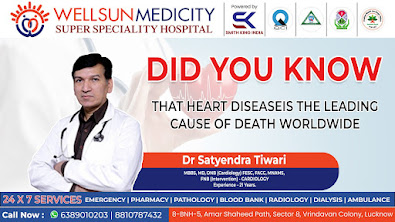A balanced
diet is crucial for heart health, as it provides essential nutrients that
support cardiovascular function and reduce the risk of heart-related diseases.
Consuming a variety of whole foods, such as fruits, vegetables, whole grains,
and legumes, offers fiber, vitamins, and antioxidants that help manage
cholesterol levels and blood pressure. Including healthy fats from sources like
olive oil, avocados, and fatty fish can lower bad cholesterol (LDL) while
promoting good cholesterol (HDL). Additionally, limiting sodium intake helps
prevent hypertension, a significant risk factor for heart disease. By focusing
on portion control and moderation, individuals can maintain a healthy weight,
further enhancing their heart health. Overall, adopting a balanced diet filled
with nutrient-rich foods is a proactive strategy for preventing cardiovascular
issues and promoting long-term wellness.
The Importance of a Balanced Diet
A balanced
diet is essential for overall health and well-being, providing the body with the
necessary nutrients to function optimally. It includes a variety of food
groups—fruits, vegetables, whole grains, proteins, and healthy fats—that
contribute to energy, growth, and repair of tissues. A well-rounded diet
supports the immune system, reduces the risk of chronic diseases such as heart
disease, diabetes, and obesity, and promotes mental clarity and emotional
stability. By prioritizing nutrient-dense foods and maintaining proper portion
sizes, individuals can achieve and maintain a healthy weight, ensuring
long-term vitality and enhancing their quality of life. Ultimately, a balanced
diet is a foundational aspect of a healthy lifestyle, fostering both physical
and mental wellness.
The Importance of a Balanced Diet
A balanced
diet is essential for overall health and well-being, as it provides the body
with the necessary nutrients to function optimally. It includes a variety of
foods from all food groups—fruits, vegetables, whole grains, protein sources,
and healthy fats—ensuring that individuals receive vitamins, minerals, fiber,
and antioxidants that promote bodily functions and boost the immune system. A
balanced diet helps in preventing chronic diseases such as obesity, diabetes,
and heart disease by maintaining healthy weight and stabilizing blood sugar and
cholesterol levels. Additionally, proper nutrition enhances energy levels and
cognitive function, improving mood and productivity. Ultimately, prioritizing a
balanced diet is key to maintaining long-term health and vitality.
Key Components of a Heart-Healthy Diet
A heart-healthy diet consists of
several key components that support cardiovascular well-being.
Healthy Heart Diet:
1. Focus on Whole Foods:
Whole foods
like fruits, vegetables, whole grains, and legumes are rich in essential
nutrients such as fiber, vitamins, and antioxidants. These foods help lower bad
cholesterol (LDL) and reduce blood pressure, both of which are crucial for
heart health. For instance, fruits like berries and vegetables like spinach are
rich in antioxidants that combat oxidative stress, a significant factor in
heart disease.
2. Healthy Fats:
Not all fats
are bad. Unsaturated fats found in olive oil, avocados, nuts, and fatty fish
like salmon are beneficial for the heart. These fats help reduce LDL
cholesterol and increase good cholesterol (HDL), promoting a healthier
cardiovascular system. Conversely, saturated fats and trans fats, often found
in processed foods, should be minimized as they contribute to plaque buildup in
arteries, increasing the risk of heart attacks and strokes.
3. Limit Sodium Intake:
High sodium
intake is linked to high blood pressure, a major risk factor for heart disease.
Reducing the amount of salt in your diet by avoiding processed foods and being
mindful of added salt can significantly lower your risk of hypertension and
heart-related complications.
4. Moderation is Key:
Portion
control is essential. Even healthy foods can lead to weight gain if consumed in
large quantities. Maintaining a healthy weight through a balanced diet and
regular physical activity is one of the most effective ways to keep your heart
in good condition.
Conclusion
Adopting a
heart-healthy diet is not about strict limitations but rather about making
smarter food choices that benefit your heart and overall health. Incorporating
more whole foods, healthy fats, and reducing sodium and processed foods can
lead to significant improvements in your cardiovascular health. As Dr. Satendra
Tiwari Sr. Cardiologist Wellsun Medicity
Hospital suggests, a proactive approach to your diet
can be a powerful tool in preventing heart disease and ensuring a healthier,
longer life.
For more
detailed guidance on maintaining a heart-healthy lifestyle, visit Top Heart
Specialists Dr. Satendra Tiwari
WELLSUN MEDICITY HOSPITAL









0 comments:
Post a Comment
we always wellcoming your feed back